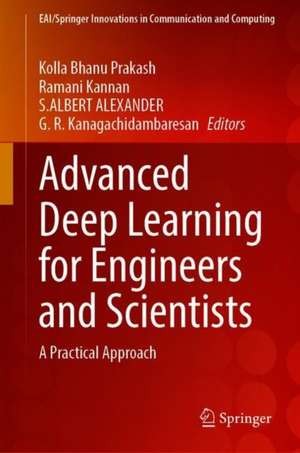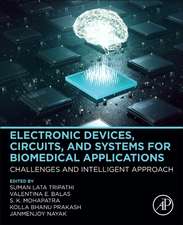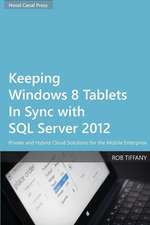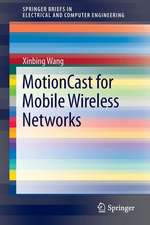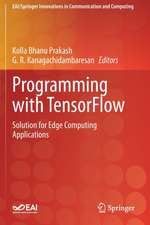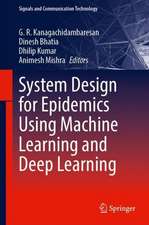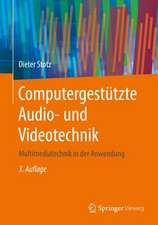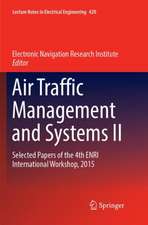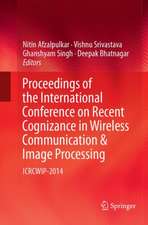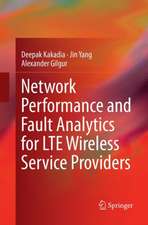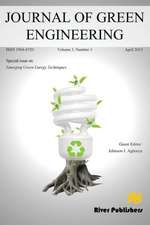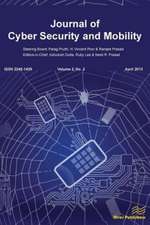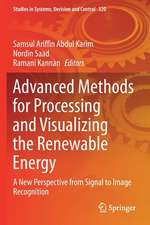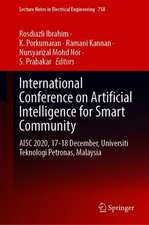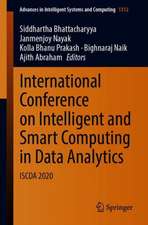Advanced Deep Learning for Engineers and Scientists: A Practical Approach: EAI/Springer Innovations in Communication and Computing
Editat de Kolla Bhanu Prakash, Ramani Kannan, S.Albert Alexander, G. R. Kanagachidambaresanen Limba Engleză Hardback – 25 iul 2021
- Presents practical basics to advanced concepts in deep learning and how to apply them through various projects;
- Discusses topics such as deep learning in smart grids and renewable energy & sustainable development;
- Explains how to implement advanced techniques in deep learning using Pytorch, Keras, Python programming.
| Toate formatele și edițiile | Preț | Express |
|---|---|---|
| Paperback (1) | 474.57 lei 38-44 zile | |
| Springer International Publishing – 26 iul 2022 | 474.57 lei 38-44 zile | |
| Hardback (1) | 638.77 lei 38-44 zile | |
| Springer International Publishing – 25 iul 2021 | 638.77 lei 38-44 zile |
Din seria EAI/Springer Innovations in Communication and Computing
- 20%
 Preț: 1165.69 lei
Preț: 1165.69 lei - 18%
 Preț: 1223.88 lei
Preț: 1223.88 lei - 18%
 Preț: 947.35 lei
Preț: 947.35 lei - 18%
 Preț: 796.61 lei
Preț: 796.61 lei - 18%
 Preț: 903.93 lei
Preț: 903.93 lei - 20%
 Preț: 937.02 lei
Preț: 937.02 lei - 18%
 Preț: 1118.62 lei
Preț: 1118.62 lei - 20%
 Preț: 734.67 lei
Preț: 734.67 lei - 20%
 Preț: 754.22 lei
Preț: 754.22 lei - 18%
 Preț: 1117.19 lei
Preț: 1117.19 lei - 18%
 Preț: 891.33 lei
Preț: 891.33 lei - 20%
 Preț: 1277.57 lei
Preț: 1277.57 lei - 24%
 Preț: 1157.45 lei
Preț: 1157.45 lei - 18%
 Preț: 959.19 lei
Preț: 959.19 lei - 18%
 Preț: 1111.22 lei
Preț: 1111.22 lei -
 Preț: 253.37 lei
Preț: 253.37 lei - 18%
 Preț: 952.09 lei
Preț: 952.09 lei - 18%
 Preț: 1260.65 lei
Preț: 1260.65 lei - 18%
 Preț: 945.62 lei
Preț: 945.62 lei - 18%
 Preț: 1015.23 lei
Preț: 1015.23 lei - 18%
 Preț: 943.07 lei
Preț: 943.07 lei - 18%
 Preț: 1236.06 lei
Preț: 1236.06 lei -
 Preț: 388.90 lei
Preț: 388.90 lei - 18%
 Preț: 780.52 lei
Preț: 780.52 lei - 18%
 Preț: 1112.30 lei
Preț: 1112.30 lei - 18%
 Preț: 946.87 lei
Preț: 946.87 lei - 15%
 Preț: 638.11 lei
Preț: 638.11 lei - 18%
 Preț: 1232.57 lei
Preț: 1232.57 lei - 15%
 Preț: 646.43 lei
Preț: 646.43 lei -
 Preț: 392.37 lei
Preț: 392.37 lei - 18%
 Preț: 1241.42 lei
Preț: 1241.42 lei - 18%
 Preț: 894.97 lei
Preț: 894.97 lei - 18%
 Preț: 894.46 lei
Preț: 894.46 lei - 18%
 Preț: 730.97 lei
Preț: 730.97 lei - 18%
 Preț: 952.09 lei
Preț: 952.09 lei -
 Preț: 394.87 lei
Preț: 394.87 lei - 15%
 Preț: 650.19 lei
Preț: 650.19 lei - 15%
 Preț: 642.68 lei
Preț: 642.68 lei - 18%
 Preț: 783.98 lei
Preț: 783.98 lei - 18%
 Preț: 899.38 lei
Preț: 899.38 lei - 18%
 Preț: 729.68 lei
Preț: 729.68 lei - 18%
 Preț: 730.65 lei
Preț: 730.65 lei - 15%
 Preț: 640.37 lei
Preț: 640.37 lei - 15%
 Preț: 646.75 lei
Preț: 646.75 lei - 18%
 Preț: 782.57 lei
Preț: 782.57 lei - 18%
 Preț: 946.55 lei
Preț: 946.55 lei - 18%
 Preț: 950.03 lei
Preț: 950.03 lei - 18%
 Preț: 787.91 lei
Preț: 787.91 lei
Preț: 638.77 lei
Preț vechi: 829.57 lei
-23% Nou
Puncte Express: 958
Preț estimativ în valută:
122.25€ • 127.15$ • 100.92£
122.25€ • 127.15$ • 100.92£
Carte tipărită la comandă
Livrare economică 10-16 aprilie
Preluare comenzi: 021 569.72.76
Specificații
ISBN-13: 9783030665180
ISBN-10: 3030665186
Pagini: 250
Ilustrații: XVII, 285 p. 281 illus., 261 illus. in color.
Dimensiuni: 155 x 235 mm
Greutate: 0.64 kg
Ediția:1st ed. 2021
Editura: Springer International Publishing
Colecția Springer
Seria EAI/Springer Innovations in Communication and Computing
Locul publicării:Cham, Switzerland
ISBN-10: 3030665186
Pagini: 250
Ilustrații: XVII, 285 p. 281 illus., 261 illus. in color.
Dimensiuni: 155 x 235 mm
Greutate: 0.64 kg
Ediția:1st ed. 2021
Editura: Springer International Publishing
Colecția Springer
Seria EAI/Springer Innovations in Communication and Computing
Locul publicării:Cham, Switzerland
Cuprins
Introduction.- Introduction to ANN.- Introduction to Deep Learning.- Deep Soft Computing using Python.- Working with Keras.- Deep learning Applications using Python.- Advanced Deep learning techniques.- Conclusion.
Notă biografică
Dr. Kolla Bhanu Prakash is working as Professor and Research Group Head for Artificial Intelligence and Data Science Research Group in CSE DEPARTMENT, K L University, VIJAYAWADA, Andhra Pradesh, India. He received his M.Sc and M.Phil in Physics from Acharya Nagarjuna University, Guntur, India, M.E and Ph.D in Computer Science & Engineering from Sathyabama University,Chennai, India. Dr. Kolla Bhanu Prakash has 14+ years of experience working in the academia, research, teaching, academic administration. His current research interests include Deep Learning, IOT, Big Data Analytics and Natural Language Processing. He was the recipient of Best Speaker award during M.Sc. He has authored over 65+ research papers in various national and international journals and conferences. His publications are indexed in Scopus, Web of Science, DBLP and Google scholar. He is IEEE – Senior Member, Fellow – ISRD, Reviewer - IEEE Access Journal, Treasurer - ACM Amaravathi Chapter, Life Member – ISTE, Reviewer and TPC member in National and International Conferences, IJRAR RMS MEMBER, International Journal of Research and Analytical Reviews, 6 Patents published, Reviewer - International Journal of Advanced Computer Science and Applications (IJACSA), Senior Member - theIRED [UACEE] and MEMBER - EXPERTS OF ACADEMIC EXCELLENCE RESEARCH CENTRE. He edited 7 books in International publishers like Elsevier, Springer, Wiley, CRC Academic press, Degryuter publishers. He is series editor in Wiley and CRC Academic press.
Dr. Ramani Kannan is a Senior Lecturer in UniversitiTeknologiPETRONAS, Malaysia. He received his B.E degree from Bharathiyar University, India. Later on completed his M.E and PhD in Power Electronics and Drives from Anna University respectively. He holds more than 115 publications in reputed international and national journals and conferences. He is an active senior member in IEEE(USA), and members of IE(I), IET(UK), ISTE(I) and Instituteof advance engineering and science. Dr. Ramani is recognized with many awards, including “Career Award for Young Teacher” from AICTE India,2012; “ Young Scientist Award” in power electronics and Drives,2015; “Highest Research publication Award” 2017. Award for Outstanding Performance, Service and Dedication 2019 at UTP, Malaysiaand “Outstanding Researcher Award” in UTP Q Day 2019, Best Presenter Award, IEEE CENCON2019 international conference at Indonesia. EDITOR–Books “Sustaining Electrical Power Resources through Energy Optimization and Future Engineering” Springer Nature Singapore Pte Ltd 2018., andPractical Examples of energy optimization models Springer Nature Singapore Pte Ltd 2019.He has completed 5 funded projects and 7 research projects in progress with a total funding of RM 1080000.00. The grants are FRGS, ASEAN-India, YUTP, KETTHA and STIRF. He is the Editor-in-Chief for the journal of Asian Scientific Research (2011-2018) and Regional Editor for International Journal of Computer Aided Engineering and technology, Inderscience Publisher, UK from 2015.He is an Associate Editor in IEEE Access since 2018.Dr Ramani is servicing many guest editor such as Elsevier journal, Inderscience, IGI Global and IJPAM etc. His research interest involves in power electronics, inverters, modeling of induction motor and optimization techniques.
Dr. S. Albert Alexander is a Postdoctoral Research Fellow from Northeastern University, Boston, Massachusetts, USA. He is the recipient of prestigious Raman Research Fellowship from the University Grants Commission (Government of India). His current research focuses on fault diagnostic systems for solar energy conversion systems and smart grids. He has 13 years of academic and research experience. He has published 15 technical papers in international and national journals (including IEEE Transactions, IET, Elsevier etc.,) and presented 23 papers at national and international conferences. He has completed 4 Government of India-funded projects and 1 multilateral project is under progress with the overall grant amount of Rs.1.86 crores. His PhD work on power quality earned him a National Award from ISTE, and he has received 22 awards for his meritorious academic and research career (such as Young Engineers Award from IE(I), Young Scientist Award from SPRERI, Gujarat etc.,). He has also received the National Teaching Innovator Award from MHRD (Government of India). He is an approved “Margadarshak” from AICTE (Government of India). He has guided 31 graduate and postgraduate projects. He is presently guiding 8 research scholars. He is a member and in prestigious positions in various national and International forums (such as Senior Member, IEEE and Vice President for Energy Conservation Society, India etc.,). He has been an invited speaker in 177 programs covering eight Indian states and also at USA. He has organized 11 events, including faculty development programs, workshops, and seminars. He completed his graduate program in Electrical and Electronics Engineering from Bharathiar University and his postgraduate program from Anna University, India. Presently he is working as an Associate Professor in the Department of EEE, Kongu Engineering College and also doing research work in smart grids, solar PV, and power quality improvement techniques. He has authored the following books in his areas of interest: (1) Computational Paradigm Techniques for Enhancing Electric Power Quality, CRC Press, (2) Basic Electrical, Electronics and Measurement Engineering, Anuradha Publishers and (3) Special Electrical Machines, Anuradha Publishers.
Dr. G. R. Kanagachidambaresan received his B.E degree in Electrical and Electronics Engineering from Anna University in 2010 and M.E. Pervasive Computing Technologies in Anna University in 2012. He has completed his Ph.D. (Wireless Body Area Networks, Healthcare) in Anna University Chennai in 2017. He is currently an Associate Professor, Department of CSE, Vel Tech Rangarajan Dr. Sagunthala R& amp;D Institute of Science and Technology. His main research interest includes Body Sensor Network and Fault tolerant Wireless Sensor Network. He has published several reputed articles and undertaken several consultancy activities for leading MNC companies. He has also guest edited several special issue volumes and books in
SPRINGER and serving as editorial review board members for peer reviewed journals. He is presently working on several Govt sponsored research projects like ISRO, DBT and DST. He is Director for the EAZYTHINGS Technology Private limited company.
Dr. Ramani Kannan is a Senior Lecturer in UniversitiTeknologiPETRONAS, Malaysia. He received his B.E degree from Bharathiyar University, India. Later on completed his M.E and PhD in Power Electronics and Drives from Anna University respectively. He holds more than 115 publications in reputed international and national journals and conferences. He is an active senior member in IEEE(USA), and members of IE(I), IET(UK), ISTE(I) and Instituteof advance engineering and science. Dr. Ramani is recognized with many awards, including “Career Award for Young Teacher” from AICTE India,2012; “ Young Scientist Award” in power electronics and Drives,2015; “Highest Research publication Award” 2017. Award for Outstanding Performance, Service and Dedication 2019 at UTP, Malaysiaand “Outstanding Researcher Award” in UTP Q Day 2019, Best Presenter Award, IEEE CENCON2019 international conference at Indonesia. EDITOR–Books “Sustaining Electrical Power Resources through Energy Optimization and Future Engineering” Springer Nature Singapore Pte Ltd 2018., andPractical Examples of energy optimization models Springer Nature Singapore Pte Ltd 2019.He has completed 5 funded projects and 7 research projects in progress with a total funding of RM 1080000.00. The grants are FRGS, ASEAN-India, YUTP, KETTHA and STIRF. He is the Editor-in-Chief for the journal of Asian Scientific Research (2011-2018) and Regional Editor for International Journal of Computer Aided Engineering and technology, Inderscience Publisher, UK from 2015.He is an Associate Editor in IEEE Access since 2018.Dr Ramani is servicing many guest editor such as Elsevier journal, Inderscience, IGI Global and IJPAM etc. His research interest involves in power electronics, inverters, modeling of induction motor and optimization techniques.
Dr. S. Albert Alexander is a Postdoctoral Research Fellow from Northeastern University, Boston, Massachusetts, USA. He is the recipient of prestigious Raman Research Fellowship from the University Grants Commission (Government of India). His current research focuses on fault diagnostic systems for solar energy conversion systems and smart grids. He has 13 years of academic and research experience. He has published 15 technical papers in international and national journals (including IEEE Transactions, IET, Elsevier etc.,) and presented 23 papers at national and international conferences. He has completed 4 Government of India-funded projects and 1 multilateral project is under progress with the overall grant amount of Rs.1.86 crores. His PhD work on power quality earned him a National Award from ISTE, and he has received 22 awards for his meritorious academic and research career (such as Young Engineers Award from IE(I), Young Scientist Award from SPRERI, Gujarat etc.,). He has also received the National Teaching Innovator Award from MHRD (Government of India). He is an approved “Margadarshak” from AICTE (Government of India). He has guided 31 graduate and postgraduate projects. He is presently guiding 8 research scholars. He is a member and in prestigious positions in various national and International forums (such as Senior Member, IEEE and Vice President for Energy Conservation Society, India etc.,). He has been an invited speaker in 177 programs covering eight Indian states and also at USA. He has organized 11 events, including faculty development programs, workshops, and seminars. He completed his graduate program in Electrical and Electronics Engineering from Bharathiar University and his postgraduate program from Anna University, India. Presently he is working as an Associate Professor in the Department of EEE, Kongu Engineering College and also doing research work in smart grids, solar PV, and power quality improvement techniques. He has authored the following books in his areas of interest: (1) Computational Paradigm Techniques for Enhancing Electric Power Quality, CRC Press, (2) Basic Electrical, Electronics and Measurement Engineering, Anuradha Publishers and (3) Special Electrical Machines, Anuradha Publishers.
Dr. G. R. Kanagachidambaresan received his B.E degree in Electrical and Electronics Engineering from Anna University in 2010 and M.E. Pervasive Computing Technologies in Anna University in 2012. He has completed his Ph.D. (Wireless Body Area Networks, Healthcare) in Anna University Chennai in 2017. He is currently an Associate Professor, Department of CSE, Vel Tech Rangarajan Dr. Sagunthala R& amp;D Institute of Science and Technology. His main research interest includes Body Sensor Network and Fault tolerant Wireless Sensor Network. He has published several reputed articles and undertaken several consultancy activities for leading MNC companies. He has also guest edited several special issue volumes and books in
SPRINGER and serving as editorial review board members for peer reviewed journals. He is presently working on several Govt sponsored research projects like ISRO, DBT and DST. He is Director for the EAZYTHINGS Technology Private limited company.
Textul de pe ultima copertă
This book provides a complete illustration of deep learning concepts with case-studies and practical examples useful for real time applications. This book introduces a broad range of topics in deep learning. The authors start with the fundamentals, architectures, tools needed for effective implementation for scientists. They then present technical exposure towards deep learning using Keras, Tensorflow, Pytorch and Python. They proceed with advanced concepts with hands-on sessions for deep learning. Engineers, scientists, researches looking for a practical approach to deep learning will enjoy this book.
- Presents practical basics to advanced concepts in deep learning and how to apply them through various projects;
- Discusses topics such as deep learning in smart grids and renewable energy & sustainable development;
- Explains how to implement advanced techniques in deep learning using Pytorch, Keras, Python programming.
Caracteristici
Presents practical basics to advanced concepts in deep learning and how to apply them through various projects Discusses topics such as deep learning in smart grids and renewable energy & sustainable development Explains how to implement advanced techniques in deep learning using Pytorch, Keras, Python programming
